

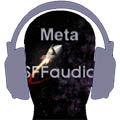 After three recent podcasts (two for SFBRP, one for the SFFaudio Podcast) I’ve prepared a listening list of the topic of INVISIBILITY. Invisibility is, I argue, ultimately not a scientific phenomenon but rather a literary one. When we use the word “visible” we are referring to something that is either seen or see-able. I can say something is more (or less) visible than something else and be correct. This concept of gradations of visibility is quite legitimate, and doesn’t often lead to any conceptual difficulty. But, we also have a tradition of negating concepts that we think we understand well – and then expecting that negation to exist too.
After three recent podcasts (two for SFBRP, one for the SFFaudio Podcast) I’ve prepared a listening list of the topic of INVISIBILITY. Invisibility is, I argue, ultimately not a scientific phenomenon but rather a literary one. When we use the word “visible” we are referring to something that is either seen or see-able. I can say something is more (or less) visible than something else and be correct. This concept of gradations of visibility is quite legitimate, and doesn’t often lead to any conceptual difficulty. But, we also have a tradition of negating concepts that we think we understand well – and then expecting that negation to exist too.
For instance. First consider the concept of pressure. Then consider these two sentences:
“This bottle is pressurized.” <-(Looks ok) "That bottle is unpressurized.” <-(Looks ok) Now consider the concept of visibility. And consider two more sentences: "This feather is visible." <-(Looks ok) "That feather is invisible.” <-(Looks... no wait! It's not ok.) So what's the difference between these two concepts and their respective negations? First, there is the problem of a conceptual equivocation in the concepts. The adjectives "pressurized" and "unpressurized" actually refer to the contents (or lack thereof) in the bottle, and not the bottle itself. Whereas in the second pair the adjectives “visible” and “invisible” refer only to the feather.
No matter, as you might be thinking, is 100% transparent. This is not completely obvious. Air seems invisible to us, but in reality even air isn’t actually 100% transparent. One strange, if incomplete, definition of MATTER might be “that which cannot be invisible.” Invisibility, therefore, can be only properly attributed to the absence of something. A perfect vacuum would be perfectly transparent, but as you are probably now realizing a vacuum is not actually a thing. It is the absence of anything.
To be sure there can be, and certainly are: unseen feathers (a black feather in an unoccupied cave), feathers that are hidden (behind something else), or even a feather that is camouflaged to look like something else. And that is the extent of feathers and their non-visibleness. The only further kind of feather we could imagine that is actually invisible must therefore be a wholly fictional feather.
So when we say things like “a glass cup is invisible in water” we can only be speaking metaphorically.
What we really mean is that the glass cup is hidden from us, it is camouflaged. This kind of invisibility is no more persuasive than saying a large city is invisible to a blind man. The city is of course visible, it is just not visible to him. And likewise the cup is visible, just not to our eyes in that medium. So the question then becomes, is it ever conceivably possible to make a man non-visible in the medium of air?
And that’s when we come to my answer.
Only in fiction.
The best expression of this is probably in the movie Mystery Men (1999). Wherein the Invisible Boy is “able to turn invisible, but only when no one is looking at him.”
So here finally, in chronological order of imagination, are just a few of the many uses of the fictional concept of invisibility:
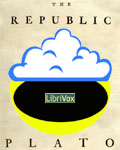 The Ring Of Gyges (extracted from Book II Part I of The Republic)
The Ring Of Gyges (extracted from Book II Part I of The Republic)
By Plato; Read by Sibella Denton
1 |MP3| – Approx. 31 Minutes [PHILOSOPHY]
Publisher: LibriVox.org
Published: February 22, 2009
Gyges, a shepherd in the service of the king of Lydia, discovers a gold ring that can make him invisible. It, along with his covetous nature are the means by which he murdered the King and won the affection of the Queen.
Written 360 B.C..
 What Was It?
What Was It?
Based on a story by Fitz-James O’Brien; Performed by a full cast
1 |MP3| – Approx. 30 Minutes [RADIO DRAMA]
Broadcaster: Syndicated to radio stations including
Broadcast: October 10, 1943
Provider: Archive.org
The story upon which this radio play was based was first published in 1859. The Weird Circle was a 1940s half hour radio drama series that ran 78 episodes in syndication from 1943 to 1945 in the USA.
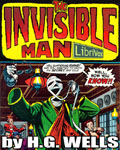 The Invisible Man
The Invisible Man
By H.G. Wells; Read by Alex Foster
13 Zipped MP3 Files or Podcast – Approx. 4 Hours 54 Minutes [UNABRIDGED]
Publisher: LibriVox.org
Published: 2006
The Invisible Man (1897) is one of the most famous science fiction novels of all time. Written by H.G. Wells (1866-1946), it tells the story of a scientist who discovers the secret of invisibility and uses it on himself. The story begins as the Invisible Man, with a bandaged face and a heavy coat and gloves, takes a train to lodge in a country inn whilst he tries to discover the antidote and make himself visible again. The book inspired several films and is notable for its vivid descriptions of the invisible man–no mean feat, given that you can’t see him!
Podcast Feed:
http://librivox.org/bookfeeds/invisible-man-by-h-g-wells.xml
iTunes 1-Click |SUBSCRIBE|
 Miss Pim’s Camouflage
Miss Pim’s Camouflage
By Lady Stanley; Read by Grant Hurlock
31 Zipped MP3 Files or Podcast – Approx. 7 Hours 49 Minutes [UNABRIDGED]
Publisher: LibriVox.org
Published: September 28, 2009
Mid-WWI, staid Englishwoman Miss Perdita Pim suffers a sunstroke gardening and gains the power of invisibility. She becomes a super-secret agent, going behind German lines, sometimes visible, sometimes not, witnessing atrocities & gleaning valuable war information
Podcast feed:
http://librivox.org/bookfeeds/miss-pims-camouflage-by-dorothy-stanley.xml
iTunes 1-Click |SUBSCRIBE|
Have a really visible day folks!

Posted by Jesse Willis






 There are a lot of new audiobooks showing up on LibriVox every day of the week. This means I get to pick and choose amongst a vast roster of titles that I could possibly tell you about. One that I was not planning to post about was a 1759 Fantasy novel by Samuel Johnson. I had nothing against Johnson. I just hadn’t read any of his books. Sure I knew he had written a dictionary, but it wasn’t one of the ones that I had read. The problem really was I just didn’t know enough about Johnson to be interested in his novel. Frankly, the first thing that came to mind when I thought of Dr. Samuel Johnson was how great a character he was in the
There are a lot of new audiobooks showing up on LibriVox every day of the week. This means I get to pick and choose amongst a vast roster of titles that I could possibly tell you about. One that I was not planning to post about was a 1759 Fantasy novel by Samuel Johnson. I had nothing against Johnson. I just hadn’t read any of his books. Sure I knew he had written a dictionary, but it wasn’t one of the ones that I had read. The problem really was I just didn’t know enough about Johnson to be interested in his novel. Frankly, the first thing that came to mind when I thought of Dr. Samuel Johnson was how great a character he was in the 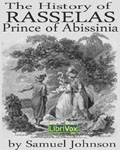

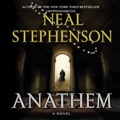 Anathem
Anathem